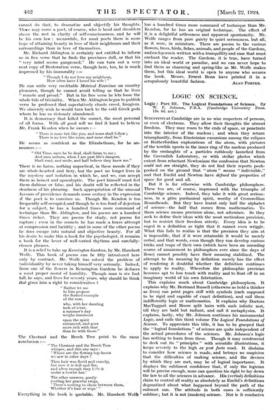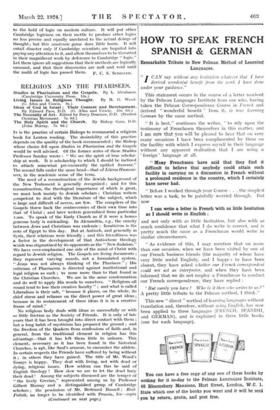LOGIC ON SCIENCE.
Logic : Part III. The Logical Foundations of Science. By W. E. Johnson, F.B.A. (Cambridge University Press.
12s. Gcl. net.)
SCIENTISTS at Cambridge are in no wise respecters of persons, or even of electrons. They allow their thoughts the utmost freedom. They may roam to the ends of space, or penetrate into the interior of the nucleus ; and when they return triumphantly, from Einsteinian excursions among the eclipses or Rutherfordian explorations of the atom, with pictures of the terrible upsets in the inner ring of the nucleus produced by the onslaughts of a particles ruthlessly launched from the Cavendish Laboratory, or with stellar photos which extort from reluctant Newtonians the confession that Newton could not see straight, they do not find their reports pooh- poohed on the ground that " atom" means " indivisible," and that Euclid and Newton have defined the properties of space for good and all.
But it is far otherwise with Cambridge philosophers. These too are, of course, impressed with the triumphs of Cambridge science. Indeed, they take it with great serious- ness, in a grim puritanical spirit, worthy of Cromwellian Roundheads. But they have learnt only half the alphabet of science—the half that comes from mathematics. To them science means precision alone, not adventure. So they seek to define their ideas with the most meticulous precision, but to restrict their freedom utterly. Every idea is to be caged in a definition so tight that it cannot even wriggle. What this fails to realize is that the precision they aim at is impossible, that if it were attainable it would be merely verbal, and that words, even though they can develop curious tricks and traps of their own (which have been an unending source of amazement to philosophers ever since the days of Zeno) cannot possibly have their meaning stabilized. The attempt to fix meaning by definition merely has the effect of rendering it doubtful whether the definition continues to apply to reality. Wherefore the philosophic precisian becomes apt to lose touch with reality and to float off in an imaginary world of his own fabrication.
This explains much about Cambridge philosophers. It explains why Mr. Bertrand Russell (otherwise as bold a thinker as lives) can print pages stiff with symbols (each supposed to be rigid and capable of exact definition), and call them indifferently logic or mathematics. It explains why Doctors MacTaggart and Moore split hairs with such infinite zest, till they are bald but radiant, and call it metaphysics. It explains, lastly, why Mr. Johnson continues his monumental Logic, and calls this third volume The Logical Foundations of Science. To appreciate this title, it has to be grasped that the " logical foundations " of science are quite independent of the actual procedures of the sciences. Mr. Johnson's logic has nothing to learn from these. Though it may condescend to deck out its " principles " with scientific illustrations, it keeps severely to the high ex post facto road. • It disdains to consider how science is made, and betrays no suspicion that the difficulties of making science, and the devices by which they are met, may be of logical importance. It displays the sublimest confidence that, if only the logician will be precise enough, none can question his right to lay down the law to all the sciences in advance. His (verbal) definitions claim to control all reality as absolutely as Euclid's definitions dogmatized about what happened beyond the path of the outmost sun. The attitude in ,both cases -is sufficiently sublime ; but it is not (modern) science. Nor is it conducive to the hold of logic on modem culture. It will put other Cambridge logicians on their mettle to produce other logics no less precise and equally unrelated to the actual doings of thought ; but this academic game does little harm. It will entail disaster only if Cambridge scientists are beguiled into paying any attention to it, and allow themselves to be thwarted in• their magnificent work by deference to Cambridge " logic." Let them ignore all suggestions that their methods are logically unsound, and that their discoveries arc null and void until the audit of logic has passed them. F. C. S. SCIIILLER.















































 Previous page
Previous page